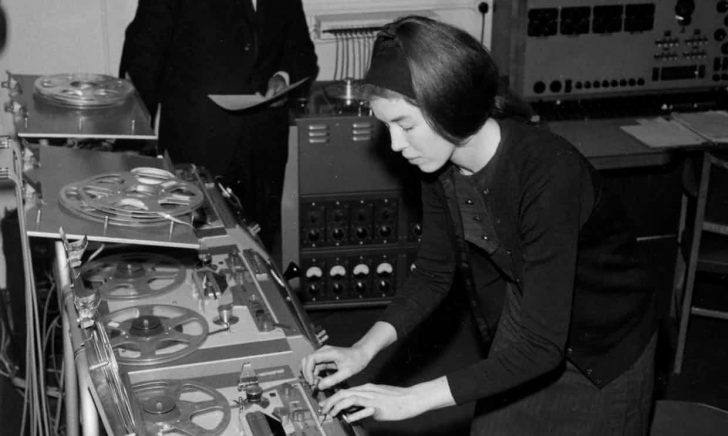
The Guardian reports that British electronic music pioneer Delia Derbyshire (1937 – 2001), best known for realization of the iconic theme for Dr. Who, has posthumously been awarded an honorary PhD by Coventry University.
The University is also launching a series of workshops in Derbyshire’s name to try to inspire young people to pursue maths and music.
Derbyshire was born in Coventry in 1937. After graduating from the University of Cambridge, she soon found work at the BBC as a trainee studio manager. In 1962, she was assigned to the BBC Radiophonic Workshop, where she worked for more than a decade in the Workshop’s golden age.
In her time at the Radiophonic Workshop, she created music and audio effects for more than 100 radio and television programs. But she’s best known for her 1963 arrangement of Ron Grainer’s theme for Dr. Who.
“Any composer of my generation with an interest in electronic sound and music cannot fail to have been influenced by Delia’s talent,” notes Mark Ayres, a composer and sound designer at the Radiophonic Workshop. “It is very fitting that Delia is receiving this posthumous honorary doctorate from Coventry University. Delia was proud of her roots in the city and deeply affected by the damage wreaked upon it during the second world war, though much inspired by the sounds she heard around her during that time.”

Her arrangement of the Doctor Who theme is unsurpassed IMO. I wish they’d bring it back instead of the overwrought orchestral banger they’re using at the moment!
“where she worked for more than a decade in the Workshop’s golden age.”
I would say that she was the reason that the Workshop had a golden age
Then you should check out some John Baker compilations!
Along with natural sound sources Delia would utilise old electronic test equipment that the Workshop had inherited from other departments in the BBC. For example, signal oscillators on which she ‘played’ the ‘swoopy’ sounding melody line on the Doctor Who theme by manually adjusting the frequency control knob – reference marks would be made on the instrument panel around the frequency dial with a Chinagraph pencil to indicate the approprate notes in a scale. She also used white noise generators frequently, again these can be heard in the Dr Who theme as sinister “swishes” and “swirls”. The Radiophonic Workshop also possessed a Brüel & Kjær type 1022 Beat Frequency Oscillator a device originally designed for electrical and electro-acoustical measurements and acoustic research but was also capable generating interesting wobbling sine waves at frequencies from 20Hz to 20kHz – a very expensive piece of kit but it does make very “spacey” sounds.
At this time – in the early 1960s – synthesisers did not exist, these vacuum tube sinewave and noise generators were the Workshop’s only source of electronically synthesised sounds. But the Radiophionic Workshop could do a lot with very little and they cobbled together a device they called as a ‘keying unit’. This consisted of a rack of calibrated signal generators – each tuned to a note in the musical scale – and an octave musical keyboard built from keys removed from a cannibalised piano. One of these units contained nine Jason type AG-10 audio generators (available in kit form) whilst the second, with an extended range provided by twelve Advance H-1 sine/square wave generators. The keying unit contained custom built electronics; a variable-mu pentode tube that routed the output of the appropriate oscillator to the final output when a note was pressed on the keyboard. Adjustable timing circuits for ‘attack’ and ‘decay’ were later added – this was an early synthesiser and Delia utilised it play the iconic leitmotif of the Doctor Who theme – Woo wee woo, woo woo wooo, etc. The schematic for the AG-10 was originally published in ‘Radio Constructor Magazine’ in 1959 so was cutting edge technology when Delia Derbyshire used it on the Doctor Who theme.
Thank you so much for your detailed comment/contribution to this article. I enjoyed reading it!
no problem man – I figured people might want some details on exactly why Dr. Derbyshire is such an inspirational figure, and why she would deserve such accolades
Here is another interesting documentary you might enjoy:
https://www.youtube.com/watch?v=fAOpVAHwLic
wonderful.